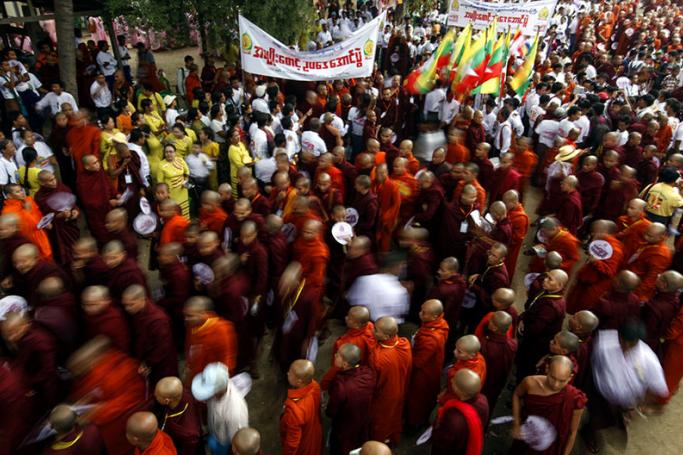Muslims make up just over two percent of Myanmar's population, government census figures showed Thursday, undercutting claims by Buddhist hardliners that Islam poses a threat to the dominance of their faith.
Full details from the 2014 count, the first of its kind in decades, was withheld for almost a year to avoid stirring tensions in the Buddhist-majority nation ahead of elections that propelled Aung San Suu Kyi's pro-democracy party to power.
Islamophobia has rippled across Myanmar in recent years, with Buddhist nationalists sending alarmist messages about the growth of the Muslim population.
But the new data affirms that Buddhists make up 90 percent of the population of 51.48 million.
They are followed in number by Christians (6.3 percent) and Muslims (2.3 percent or over 1.1 million people).
However, the survey does not include the one-million strong stateless Rohingya Muslim minority, who were banned from self-identifying during the census taking.
Added together, their number doubles the country's share of Muslims to around four percent -- an estimate that has been in circulation since the last census in 1983.
"Some were worried that there could be a significant difference in the numbers of each religion," Thein Swe, Minister of Labour, Immigration and Population told reporters in the capital Naypyidaw as he released the data.
"But there is not much difference when compared with the census data in 1983."
The United Nations Population Fund (UNFPA), which supported Myanmar's government in carrying out census, said the figures should extinguish incendiary rhetoric.
"It is time to replace speculation with fact," the UNFPA's Janet E. Jackson said in a statement.
But the UNFPA hit out at the Rohingya's exclusion from the data as "a serious shortcoming of the census and a grave human rights concern".
-- hardliners under pressure –
More than 100,000 Rohingya were displaced by deadly clashes with Buddhists in 2012 and now live destitute in camps in western Rakhine state.
They are denied citizenship and face severe restrictions on their movement and access to basic services.
Just days before the census was carried out in 2014, Buddhist nationalists accused the international community of bias towards Muslims and attacked humanitarian offices in Rakhine, forcing aid workers to flee.
De facto premier Suu Kyi has faced criticism for not taking a stronger stance on the Rohingya or publicly condemning two recent attacks on mosques in other parts of the country.
But her government has made moves in recent weeks to rein in the Ma Ba Tha, a monk-led movement at the fore of anti-Muslim protests in recent years.
At the core of their ideology is the belief that Myanmar's Buddhist identity is under attack from Muslims and other ethnic minorities, despite the country hosting such groups for generations.
Under the previous military-backed government, the nationalist group successfully lobbied for the passage of controversial race and religion laws that rights groups say discriminate against women and religious minorities.
Earlier this month Suu Kyi's religion minister warned the group could be disbanded if it uses hate speech to stoke conflict.
© AFP
You are viewing the old site.
Please update your bookmark to https://eng.mizzima.com.
Mizzima Weekly Magazine Issue...
14 December 2023
Spring Revolution Daily News f...
13 December 2023
New UK Burma sanctions welcome...
13 December 2023
Spring Revolution Daily News f...
12 December 2023
Spring Revolution Daily News f...
11 December 2023
Spring Revolution Daily News f...
08 December 2023
Spring Revolution Daily News f...
07 December 2023
Diaspora journalists increasin...
07 December 2023
Dump trucks join commercial vehicle rally in support of the NLD












